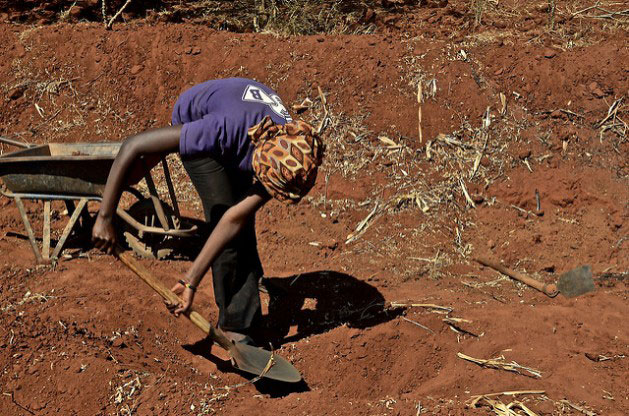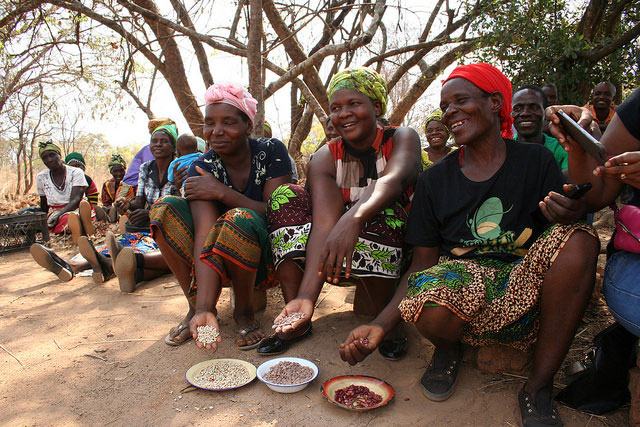
Healthy soil not only makes food more nutritious it also helps keep carbon out of the atmosphere by storing it underground.
Yet around the world over 500 million hectares of soil has become degraded – leading to the loss of valuable nutrients as well as the release of carbon, speeding up the process of man-made climate change.
Climate change then in turn, affects crop productivity creating a negative cycle for farmers, Lucrezia Caon Global Soil Partnership Consultant at FAO told IPS.
“If we degrade soil they admit carbon dioxide (CO2), that fosters climate change, and climate change effects crop productivity,” she said.
IPS spoke to Caon at an event ahead of World Soil Day, which is marked on December 5.
The event focused on the special role of pulses in preserving soils.
2016 is International Year of Pulses, following on from 2015, which was the International Year of Soil.
Pulses include peas, beans, chickpeas and lentils. They are particularly popular in South Asia and Latin America.
Pulses are generally more popular in developing countries than developed countries, Caon noted.
“Seventy five percent of pulses are consumed in developing countries and only 25 percent in developed countries,” she said.
 Pulses are good for nutrition and income, particularly for women farmers who look after household food security, like those shown here at a village outside Lusaka, Zambia. (Credit: Busani Bafana / IPS)
Pulses are good for nutrition and income, particularly for women farmers who look after household food security, like those shown here at a village outside Lusaka, Zambia. (Credit: Busani Bafana / IPS)
According to the FAO, pulse crops are one of the most sustainable crops a farmer can grow.
“Pulses are a very good ally in combatting and adapting to climate change because of the soil organic matter content they provide to the soil,” said Caon.
“Pulses have deep root systems which basically once you harvest the plants, or the root dies, keep the carbon in the soil,” she added.
Plants also keep carbon in the soil in other ways, said Caon. Leaves which fall from the plants are taken back up into the soil as organic carbon, while plants also stimulate microbial activity fostering additional organic matter.
“Soil organic matter is basically constituted by the leaves and organisms,” said Caon. “It’s really a form in which carbon can be taken into the ground and not into the atmosphere in the form of carbon dioxide which causes climate change and the greenhouse gas effect.”
In addition, pulses are much more water efficient than other sources of protein. According to the FAO it can take as little as 43 gallons of water to grow one pound of pulses, compared to 216 gallons for soybeans and 368 gallons for peanuts.
The benefits of pulses to soil mean that they can also help combat land degradation, Melchiade Bukuru, Chief, of the UN Convention to Combat Desertification Liaison Office told IPS.
“Today we have over 500 million hectares degraded in the world that are begging us to bring them back to the fertile status.”
“Pulses can help to restore the land that was degraded because they bring fertility to the soil,” said Bukuru.
The process of land degradation, also known as desertification happens all over the world, Bukuru explained.
“Seventy-eight percent of land degradation occurs in ecosystems other than the desert.”
“I don’t know any country where they don’t experience land degradation, so it’s a global target of achieving land degradation neutrality by 2030.”
Join us in defending the truth before it’s too late
The future of independent journalism is uncertain, and the consequences of losing it are too grave to ignore. To ensure Truthout remains safe, strong, and free, we need to raise $43,000 in the next 6 days. Every dollar raised goes directly toward the costs of producing news you can trust.
Please give what you can — because by supporting us with a tax-deductible donation, you’re not just preserving a source of news, you’re helping to safeguard what’s left of our democracy.